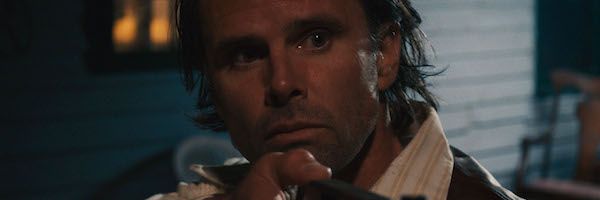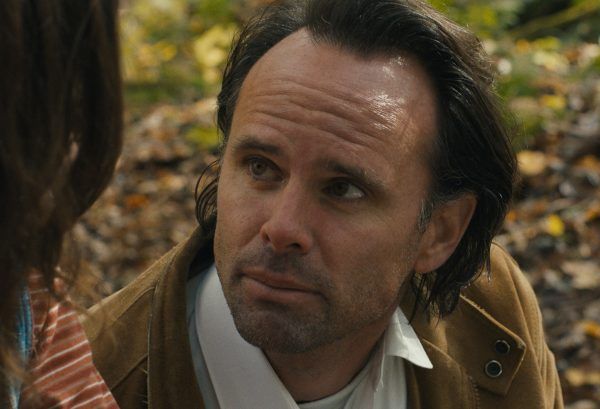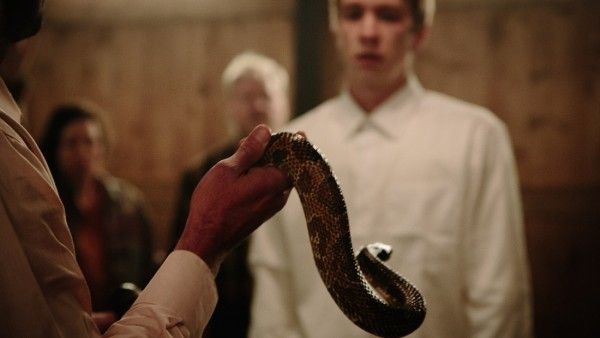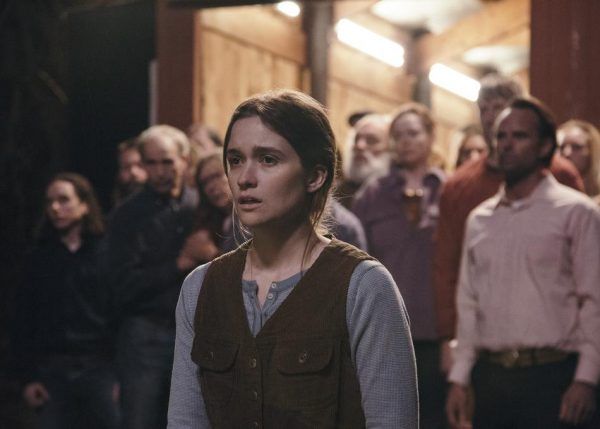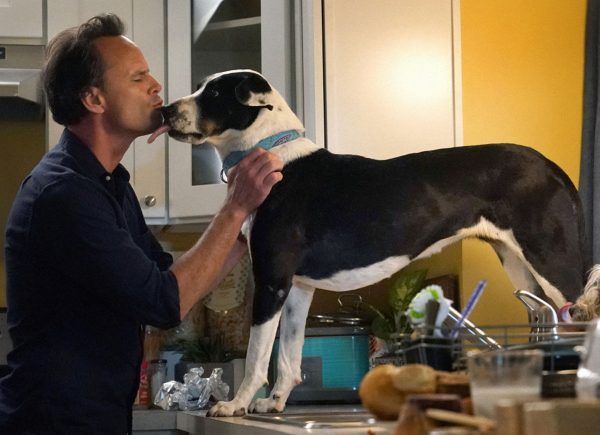From writer/directors Britt Poulton and Dan Madison Savage, the indie drama Them That Follow is set deep in Appalachia, where Pastor Lemuel Childs (Walton Goggins) presides over a Pentecostal sect of serpent handlers. At the same time, his devoted daughter, Mara (Alice Englert), is preparing for her wedding day while also being forced to confront the fact that a dangerous secret could put her directly at odds with the traditions of her family and community.
At the film’s Los Angeles press day, Collider got the opportunity to sit down and chat 1-on-1 with actor Walton Goggins about why he wanted to be a part of telling this story, the appeal of playing this character, the mysteries of different types of religion, why people tend to be afraid of snakes, and faith vs. family for his character. He also talked about his role in the outrageous new HBO series The Righteous Gemstones, and why he wanted to play the lead role in the upcoming CBS comedy series The Unicorn.
Collider: Watching this, it seems obvious why you would want to play the character like this and be a part of telling a story like this, but was it apparent, on the page, the first time that you read the script? Were there conversations about who this guy would be?
WALTON GOGGINS: Yeah, that’s how I saw it, when I read it, the first time. What I was so blown away by were the words on the page, and the conflict and struggle that the lead character, Mara, played by Alice Englert, has in this story. It is very of this moment, the decision that she has to make and the journey that she’s on, and yet it’s also, simultaneously, from another time. I suppose what I try to do is to make her decision to ultimately leave this community as difficult as possible, and I try to do that through love. This practice, that they have in this community, is misunderstood and misaligned, on a number of levels, of course, but you should at least understand it to disagree with it. But what is undeniable is the love that this man has for his daughter.
For me and for everyone involved, especially for the writer/directors, Britt and Daniel, it was important not to take sides, and to just show the stakes that are involved with living a life, or making a decision, that runs contrary to what all of these people believe, spiritually. It wouldn’t be a big deal in a lot of other communities. It just wouldn’t be. But for these people, it’s life or death. Humans are incapable of passing judgment. That has to come from God, and the vehicle through which that atonement is made, in this particular circumstance, is through handling deadly snakes. We didn’t make this up. Britt and Daniel didn’t make this up. This practice has been going on for 125 years, in America. The first Pentecostal church in America was here in California, believe it or not, at least as far as I understand, in the 1920s, and it proliferated from here. This is just a way that a very small group of people, in this country, show their devotion and worthiness in God’s eyes. It’s something I’m very proud of. I think it says a lot about a lot.
People find snakes so mysterious, in general, because they don’t quite understand them, and then when you add that to religion, it’s something that’s even more difficult to understand for some people.
GOGGINS: My wife and I found an article about why snakes are so scary, or at the center of fears that people have. For a number of people, snakes are always a part of that list. For me, it’s number one on that list. It’s not sharks, and it’s not spiders. Heights is on there, on some level, but it’s really snakes. And we both found this article that talked about snakes, from the point of view of just their movement. I’m sure there is a survival instinct, with things that can hurt you, and that’s a part of our DNA for thousands of years. We can’t make sense of their movement. There is no way in which to predict what they will do, and things that are unpredictable are anathema to surviving, as a human being, and that’s what this article was all about. It was extraordinary, really, because I had never thought about it in that way. In some ways, you can see other animals movements or the unknown coming, as a threat from a hurricane or tornado, even though that’s a bit unpredictable, too. But snakes, it’s up close and it’s intimate. It’s personal, and you just can’t make sense of what they’re doing. The snake has been cast in the role of the villain, since the very beginning. That is the Christian origin story. So, it represents things that are nefarious and harmful to us, in story, since the very beginning. Why is that the case?
Do you think that this is the guy that puts faith before family, or does he see it as kind of one thing?
GOGGINS: I think he sees it all as one. Faith and family run synonymous. This is a community who don’t have much. They really don’t. But what they do have and the great equalizer is that they have their faith, and that is a very powerful thing to have in one’s life. Me, Walton Goggins, as a secular individual, living in urban America, I envy their conviction. I do. I’ve been all over the world and have read books on a lot of them, and at times in my own life, I struggle to find answers to questions that my child has, that are readily available to people that have a very strict theology. Of course, it can be stifling, but it can also be liberating. I think I’m still just trying to make sense of all of it. But for Lemuel, the character that I play in the story, and for Olivia Colman’s character and everybody in this film, with the exception of Thomas Mann’s character, this makes sense. We’re all looking for order and parameters. We all need them. We want to know the room that we’re sitting in. It becomes easier when we’re able to touch all of those walls and know where the light switches are.
Especially when you think about the bigger picture of how we’re all living on this planet that just hangs in the middle of the galaxy somewhere. It seems so bizarre, and it makes sense that people would want and need some sort of explanation.
GOGGINS: Absolutely, yeah, and there are a number of different explanations out there. But when I’m laying there on a blanket, and I’m looking up at the stars and talking to my son about the constellations in the sky, and after he’s fallen asleep, or there’s some moment of silence, I contemplate where we are and the world, and how we’re on this planet that’s just making its way around a star, in this one solar system. It becomes so intimidating to me. It becomes so liberating and also profoundly sad to me. I don’t know how to make sense of it. In those instances, I look for things. Human beings, by and large, look for things, so that they can categorize our origins, in that way.
Does it help to offset a character like this with doing more comedy?
GOGGINS: Yeah. I’m a pretty serious person. I laugh a lot, too, but I would say, more often than not, I’m an earnest person, and what you see is what you get, for the most part. To step outside of that, life will continue, regardless of our understanding of it. I suppose the point would be to endeavor to understand it more, and that’s what I try to do, and I think that’s no different than the people in this movie and what they try to do. Laughter is a big part of that. Once you’re able to step away from it and give yourself a break from it and just laugh, that’s the greatest kind of medicine that you can have.
When you do something like The Righteous Gemstones, your dealing with religion at the height of absurdity.
GOGGINS: I play a preacher in The Righteous Gemstones, and it was not lost on me that I’d been talking to Danny [McBride] about doing that for a year, which was a little bit before this movie came my way. I was like, “What is going on in my life? What do I need to learn from this?” I found myself standing in the center of another pulpit. But the difference between these two experiences has been jarring, in a way. In one instance, it’s very sincere. And in another instance, it’s corrupt. It’s corrupted by money and the material things that can come from the manipulation of peddling a belief. With Them That Follow, it’s earnest and heartfelt.
It makes you wonder what Baby Billy Freeman would think of Lemuel, and vice versa.
GOGGINS: I would think that he would say that Baby Billy Freeman and the Gemstones have lost their way, which is what I think Danny is saying about that story. On the righteous path, there’s a very big difference preaching between the prosperity gospel vs. preaching the gospel of God and the Bible and the purity of the word. Those are two very different experiences, spiritually. At least they are for me, as an observer.
When The Unicorn came your way, were you actively looking for something that different from what we’ve seen you do?
GOGGINS: No, I wasn’t looking for that. When it came my way, I didn’t think, “Wow, now I want to do something different from me. I want to be seen in a different light.” It wasn’t self-serving. I just thought it was a story that needed to be told. I feel that, at least for me, I’m tired of irony. I really am. I’m tired of the glib, ironic way in which we’ve grown accustomed to looking at life. I’m ready for something kind and earnest and heartfelt, that isn’t afraid of sentiment and showing you its emotion. That’s what the writers of The Unicorn also wanted to do. I feel that, if we do it right, we can be a watering hole for people that have gone through a difficult period in their life, and are making their way back from it. That’s what this central character, Wade Felton, is doing, along with his two daughters and his community. I think that’s important. That’s what I to see. So, that’s what we’re trying to do.
What’s it been like playing a father?
GOGGINS: If you’re lucky enough to be around long enough and you age in this business, then you will inevitably get the opportunity to play a father. The thing about The Unicorn that is so daunting and really scary for me – and it’s really maybe the most scared I’ve ever been, and it’s the most unnerving – is that it really is closer to who I am as a person than anything I’ve ever played. There’s a part of me that’s Lemuel, for sure. There’s a part of me that’s Boyd Crowder. There’s a part of me that’s Venus. There’s a part of me that’s Lee Russell. There’s a part of me, in every single character. There’s Wade in all of us, or Delia, who’s played by Michaela Watkins, or Ben, played by Rob Corddry, or Omar Benson Miller’s character, or Maya Lynne Robinson. We become every single character, in that story. We are either seeking advice or seeking comfort, or we are giving advice or giving comfort. That’s what you do, in a reciprocal life’s relationship and a community. That story is about community. For me, in my circuitous way and my random simulation of thoughts, Wade is very, very close to who I am, so I have nothing to hide behind. It’s just me. I am a dad. I’ve been a dad for almost 9 years, and I’ve had great pain in my life and come back from it. So, this story of The Unicorn speaks to me on a very visceral level. I can’t wait for people to see it.
Them That Follow is now playing in theaters.

